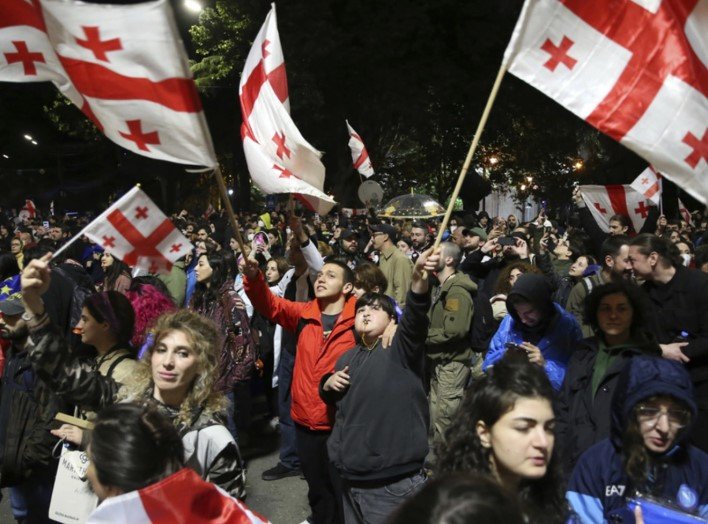French President Emmanuel Macron called for the release of demonstrators detained in Georgia during a crackdown on pro-European Union protests, emphasizing the need for dialogue and respect for civil liberties. This came in a phone conversation with billionaire former Prime Minister Bidzina Ivanishvili, a figure many believe still holds significant power in the country.
The phone call, which took place on Wednesday, focused on the ongoing unrest in Georgia, where protests have erupted in response to the government’s decision to pause its bid for European Union membership. Macron condemned the crackdown on protesters and journalists, urging the Georgian authorities to release those arrested and to respect the right to free speech and peaceful assembly.
Macron Condemns Police Violence Against Protesters
The protests in Georgia have been fueled by a growing sense of frustration with the government’s shift away from Europe and its increasing ties to Russia. Following parliamentary elections in October, which the opposition accused of being fraudulent, thousands took to the streets, demanding the resignation of the ruling party and the return to the EU accession process.

In his conversation with Ivanishvili, Macron expressed his concern over the use of force by Georgian police to suppress demonstrations. Reports have shown security forces firing tear gas and water cannons at protesters, while opposition leaders and journalists have been targeted. More than 400 people have been arrested since the unrest began, with many opposition offices raided and their leaders detained.
“I strongly condemn the intimidation of civil society, as well as police violence against peaceful demonstrators and journalists,” Macron said during the call. He also expressed regret that Georgia had “diverged from its European path,” warning that the EU’s relationship with the country could be impacted by its actions.
Ivanishvili’s Response and Call for Dialogue
Bidzina Ivanishvili, the founder of the ruling Georgian Dream party, which has been accused of steering the country toward Russia, responded positively to Macron’s appeal. Although he no longer holds an official position in the Georgian government, Ivanishvili is still seen as the key powerbroker behind the scenes. During the call, he thanked Macron for his initiative and expressed openness to working together toward a resolution.
The Elysee stated that Macron had emphasized the importance of dialogue between all political factions in Georgia, as well as with representatives of civil society. He called for a solution that would align with Georgia’s European and democratic aspirations. Ivanishvili also appeared to welcome the idea of joint efforts but did not provide details on the specific actions the Georgian government would take.
Protests Continue as EU Talks Stall
The phone call came amid escalating protests in Georgia. Thousands of demonstrators gathered in the streets on Tuesday for the 13th consecutive day of protests, voicing their anger over the government’s decision to suspend EU accession talks. The unrest follows allegations of electoral fraud during the parliamentary elections on October 26, with opposition leaders calling for the resignation of Prime Minister Irakli Kobakhidze and other senior officials.
The government’s move to halt talks with the EU, announced on November 28, sparked even more public outrage. Many protesters view the decision as a step closer to aligning with Russia, a shift that is deeply unpopular with Georgia’s pro-European population. Protests have been met with a strong police response, leading to further arrests and clashes.
The violence and arrests have sparked widespread condemnation from international observers, including the EU and other Western nations. Macron’s intervention highlights the growing concern among European leaders about the future of Georgia’s ties with the EU and its democratic standards.
Tensions Mount Between the West and Georgia’s Leadership
Macron’s intervention also comes at a time of increasing tension between Georgia’s leadership and its Western allies. The EU had previously supported Georgia’s aspirations for closer ties, but the recent political developments have raised doubts about the country’s commitment to the European path.
Macron’s comments about the EU relationship being “necessarily affected” if the crackdown continues are a clear signal of the stakes involved. The French president’s call for an inclusive dialogue could be a way to prevent further deterioration in Georgia’s international standing. However, the Georgian government has yet to respond to Macron’s specific demands regarding the arrested protesters.
The situation remains fluid, with the potential for further unrest if the government does not act swiftly to address the grievances of the protestors. For now, the focus remains on the phone calls and the diplomatic pressure mounting on Ivanishvili and his government to find a resolution to the crisis.
